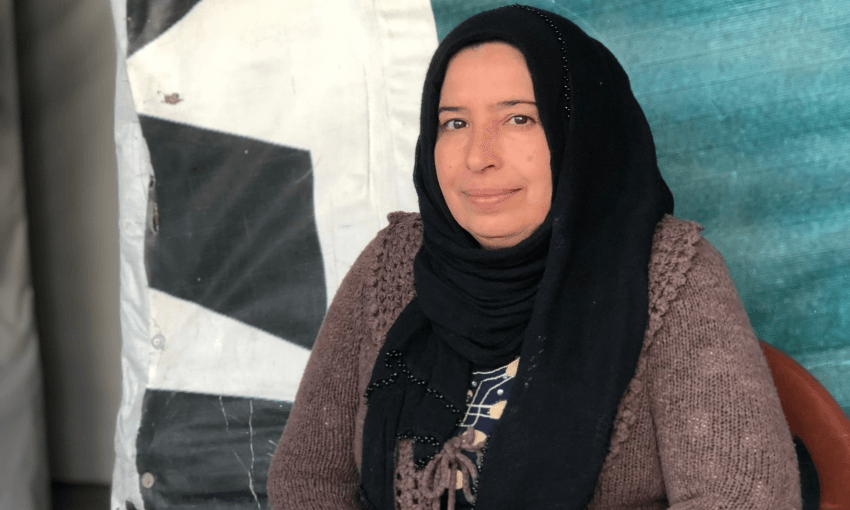New Zealanders have shown they care about the terrible situation refugees have found themselves in. But for so many people languishing in camps, they currently have no chance at all to make it here, writes national director of World Vision New Zealand Grant Bayldon.
As we sit on cushions inside Khelfa’s plastic tent drinking thick black coffee, it would be easy to miss the fact that there’s a war on just 15 kms away.
Outside, the nearby snow-covered hills that mark the border with Syria – and safety – are catching the last of the day’s wintery sun. But the protection they bring only goes so far.
Escaping over these hills to Lebanon meant an end to the bombings and the terror for Khelfa and her family, but as the years have gone by and the war has ground on, life here as refugees has been hard, and it’s getting worse.
Six years after fleeing, the family are struggling to stay afloat. Khelfa explains that her husband is unwell and cannot work, and they are in debt. Her eldest son, just 14, has left school to work, but the money he brings in isn’t enough.
Khelfa’s younger children are in school; when we ask if she has been thinking of sending her other children to work she nods – “we need to survive”.
The winter they are emerging from was especially harsh, as snowstorms blasted the area for weeks. “The worst thing about being here in the settlement has been the cold and the storms and flooding.”
But Khelfa’s concern for her children means that, despite the hardship, she will not be returning to Syria anytime soon.
“We know children as young as 14 who were conscripted by military groups and ended up being killed. If I go back, this could happen to my children.”
Outside the tent, children are crowding around to check us out and maybe have their pictures taken. Some were born here, others have few memories of the homes they left. But like their parents, these children have no long-term future in Lebanon.
For while the Lebanese government has allowed people to come, it hasn’t allowed them to integrate. Refugee camps are forbidden so Khelfa pays crippling rent to the neighbouring farmer for the tiny piece of land her shelter sits on. And apart from a narrow range of options, Syrian refugees can neither legally work here, nor access many government services.
Everyone I have spoken to longs for home. But for some people here – like child-headed households, women without male partners or people with special needs – life is untenable as a refugee in Syria’s neighbouring countries. For them, the chance to be resettled to a 3rd country like New Zealand can be a lifeline.
For the last six years I’ve been part of working to encourage successive New Zealand governments to allow more refugees like Khelfa to come to safety in New Zealand. After 30 years with an unchanged refugee quota, images of the tiny body of Alan Kurdi – washed up on a Turkish beach in 2016 – provided a catalyst for the New Zealand government to allow an emergency intake of Syrian families.
As public concern about the plight of refugees, especially Syrian, grew, the previous and current governments each made increases to New Zealand’s tiny refugee quota.
But despite being the catalyst for the quota increase, Syrian families like Khelfa’s are effectively barred from making it to New Zealand by the government’s decade-old refugee quota formula. This only welcomes refugees from Africa or the Middle East if they already have family in New Zealand. Khelfa does not.
So, with home not safe to return to and no realistic prospect of being allowed to come to a third country like New Zealand, Khelfa has no option but to do her best to hold her family together here, almost within sight of her country.
She is not without support. Many New Zealanders have given generously to World Vision’s appeals and our 40 Hour Famine which have provided life-saving help. Through this and other funding, toilets have been built to prevent disease spreading through the crowded community. An early childhood programme is transitioning children into school, which previously many have missed out on. As we leave the World Vision water truck arrives, refilling the family’s plastic barrels with clean, safe water.
But eight years on from the start of the war the funding that World Vision needs to continue this work is under threat.
It’s increasingly difficult to fundraise for a need that is now rarely in the headlines. Without more funds, we’ll soon be forced to make impossible choices about which families we can no longer help and which of the desperately needed services to stop. For the sake of Khelfa and her children we can’t let that happen.
Grant Bayldon is national director of World Vision New Zealand. You can support their work with Syrian refugees by going to worldvision.org.nz
